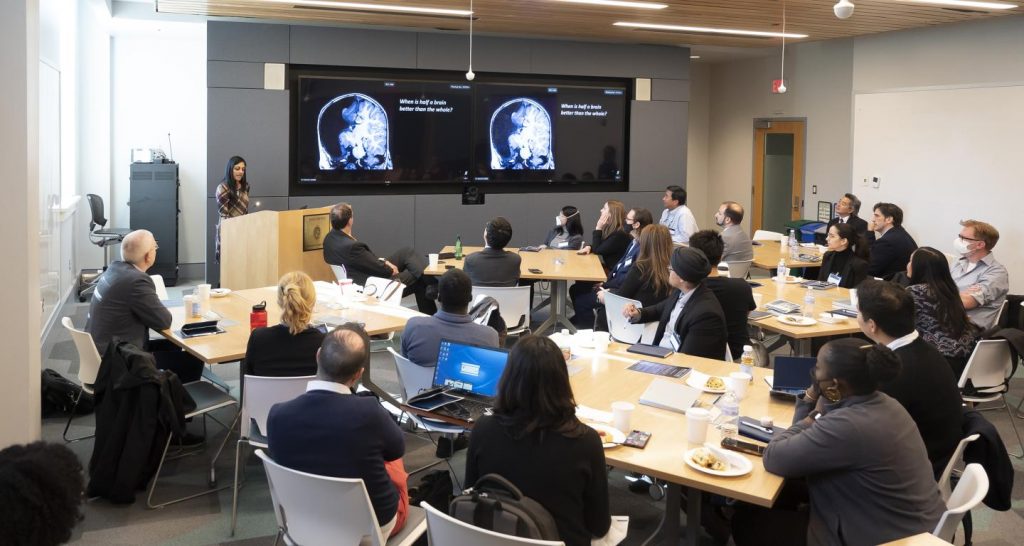USA (Johns Hopkins University) Workshop prepares young scientists, engineers for professional challenges

Annual Rising Stars workshop brings together trainees from diverse backgrounds for professional development, networking, and mentorship
ByKristen Swaney / Published a day ago
Less than 8% of engineering faculty members around the country identify as members of underrepresented groups. A workshop held last month on the Homewood campus is on a mission to change that.
Co-hosted by Johns Hopkins University’s Department of Biomedical Engineering and Columbia University, the third annual Rising Stars in Engineering in Health Workshop aims to help trainees from diverse backgrounds prepare for future academic careers in science and engineering. This year’s event was attended by 20 of the nation’s best junior biomedical researchers, who participated in two days of intensive career-development workshops, networking activities, and panel sessions.
“Research has shown that postdoctoral fellows from underrepresented groups tend to leave academia after their fellowships,” said Sridevi Sarma, associate professor of biomedical engineering, vice dean for graduate education at the Whiting School of Engineering, and one of the event organizers. “Rising Stars was inspired by an eight-week-long NIH-funded program called ‘IMPACT’ that works with postdoctoral fellows from under-represented groups to prepare them for academia. Like IMPACT, the Rising Stars workshop includes various activities related to soft skills and professional development.”
The ability to explain research clearly and to a variety of audiences is an important skill for scientists. So Rising Stars participants worked in small groups with faculty from Johns Hopkins and Columbia to craft short “lightning talks” that summarized their work in under five minutes. Participants helped each other communicate the significance of their work, identify aspects that others might find interesting, and avoid terminology that might be confusing to non-experts. By the end of the workshop, the Rising Stars were prepared with interview-ready research talks that incorporated feedback from faculty and their peers.
“The goal of the lightning talks is to develop professional communication skills that will help trainees communicate their science to a broad audience, deliver more impactful speeches, and interview more effectively,” Sarma said.
Faculty from Johns Hopkins, Columbia, and Cornell University, as well as former Rising Stars workshop participants, answered questions during three career panel sessions. Panelists discussed how to stand out during the job application process, negotiate offers, and balance multiple obligations while setting up a lab and preparing for tenure.
“One of the hard things in science is figuring out what’s a distractor and what’s going to yield gold, because everything is interesting and we are all very curious people,” said Kathleen Cullen, professor of biomedical engineering at Johns Hopkins, in response to a question about how to prioritize research projects. “It’s tempting to get involved in many projects, especially as you’re setting up your lab. It’s critical to figure out what your bread and butter is, what you know you can get done, and what is a really important question, and maintain that vision while still being open to new ideas that will help push you in the right direction. When you see an opportunity, be mindful of whether that really is an opportunity.”
“You become the product of your environment,” added Warren Grayson, professor of biomedical engineering at Johns Hopkins. “What happens as you start your lab in your new environment is that you have so many complementary people around you, and there are so many ideas that come at you, things that you haven’t thought about, that push your research in a direction that you may not have imagined. And that’s a really positive thing.”
Workshop participants developed important interviewing skills through exercises led by the Whiting School of Engineering’s Center for Leadership Education. Using improv and other techniques, participants learned strategies to help them relax before an interview, craft stories to answer interview questions, prepare for informal one-on-one conversations, and build confidence while talking about themselves and their work.
The workshop also provided participants with opportunities to build their professional networks through mentorship, group activities, and networking events.
“Through two days packed with hands-on activities, the Rising Stars are provided with mentorship from Johns Hopkins and Columbia faculty and other tools that prepare them to excel in the next stage of their academic careers,” said Jeremias Sulam, assistant professor of biomedical engineering at Johns Hopkins and an organizer of this year’s event. “Importantly, this workshop provides an opportunity for these future leaders in the field to create a long-lasting network with their future colleagues. The Rising Stars in Engineering in Health Workshop makes the imperative statement that excellence in academia cannot be accomplished if not through diversity and inclusion.”
Posted in Science+Technology, Student Life
Tagged sridevi sarma
